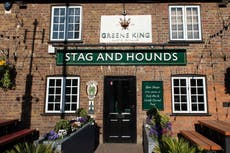Pub closures: Is coronavirus calling time on a way of life?
In his latest reflection on places and pathways, Will Gore muses of coaches and highwaymen


The miserable news this week that Greene King is to close 79 pubs as a result of the coronavirus pandemic hardly came as a surprise. But it’s a bitter blow nonetheless; and other chains and independents will surely follow.
Some of the closures will certainly be permanent; others may be slated to be temporary, but the present climate is less than hospitable for the hospitality industry.
In any event, the impact of the coronavirus restrictions has only served to hasten the decline of what headline writers tend to dub “the great British boozer”. At the turn of the century, there were nearly 61,000 pubs in the UK; by 2018, there were around 47,600. Changing consumer habits have withered demand.
It would be wrong to view this as an unmitigated disaster. Many of the pubs which have ceased trading were second rate to put it mildly; many of those which have survived have done so by improving, or by offering additional services – in some cases doubling as the village shop and post office.
A good walk may be its own reward; but a pub along the way – or at the tired conclusion – is a glorious bonus (even the ropey ones)
There is also a danger when discussing pub closures of getting sucked into a nostalgic – even patriotic – cliche, imagining only picturesque public houses next to freshly mown village cricket fields. Those pastoral scenes do exist, but they are the exception.
Even so, when the news of Greene King’s announcement broke, I couldn’t help but reflect on the degree to which I regard pubs as central to my vision of not only my own life, but my view of this country. Indeed, when I consider previous columns in this Tracking Back series, I am almost embarrassed at the number of occasions a pub gets a mention.
And it is odd on the face of it, since I don’t spend my time carousing around local taverns, and have never reached “regular” status at any given establishment. I have not experienced – as two of my school friends did the summer after they finished university – the shame (or joy) of arriving at the bar, only to find that my usual pint is already being poured by the barmaid who knows my tipple of choice and saw me coming.
There have been momentous and memorable times though: my first snog at The Eagle; my first kiss with my now wife at The Granta; friendships for life confirmed at the Rose & Crown; going from workmates to mates at The Harrow; becoming part of a community at The Halfway House; buying juice and crisps for my children at the Full Moon, just as I was bought juice and crisps by my parents at The Cheshire Cheese Inn many years ago. If I stop to think of the pubs that have provided the backdrop to key scenes in my 41-year narrative, the list could go on and on.
But it is most of all the pubs that I have found on country walks that I think of, and that I wistfully dream of. Some of them have been a deliberate destination, others encountered fortuitously, just when it seemed that we might go hungry or have our thirst unquenched. Once or twice, maps have – by their little pint glass symbols – held out the promise of a rest; only to be shown up by Monday closing or, in one terrible case, a permanently barred door. A good walk may be its own reward; but a pub along the way – or at the tired conclusion – is a glorious bonus (even the ropey ones).
It isn’t only the potential for sustenance that I long to find in a rural public house though, but a connection with the past. When I tramp over hills and through woods, I wonder not only at the landscape but also at the thought that others over centuries gone have done just the same; their usual preoccupations – like mine – pushed aside for a moment at the sudden emergence of a beautiful view, or perhaps the sound of a drumming woodpecker.
Likewise, when I stop at a pub – especially one that has known the ravages of time – I think of other passers-by who have felt a surge of relief as they come near; and who have sat in its quiet corners, nursing a drink and their thoughts. And I ponder too on those who will follow.
In his poem “Up in the Wind”, that greatest of all writers of nature, Edward Thomas, described his first visit to the remote White Horse pub in Hampshire – “…that forest parlour, / Low and small among the towering beeches...” – where “While I drank / I might have mused of coaches and highwaymen, / Charcoal-burners and life that loves the wild.”
In a disordered world, let’s hope that last orders are not being taken for a final time.
Join our commenting forum
Join thought-provoking conversations, follow other Independent readers and see their replies
Comments


Bookmark popover
Removed from bookmarks